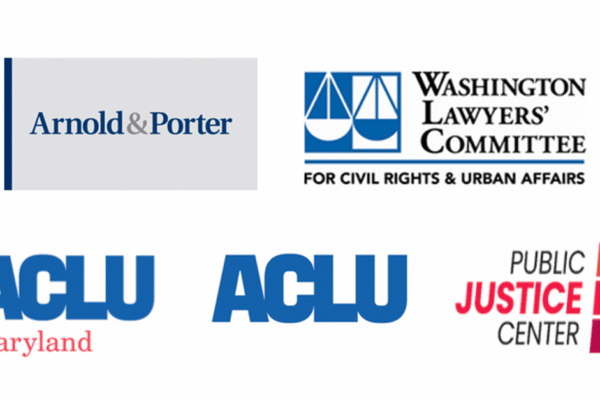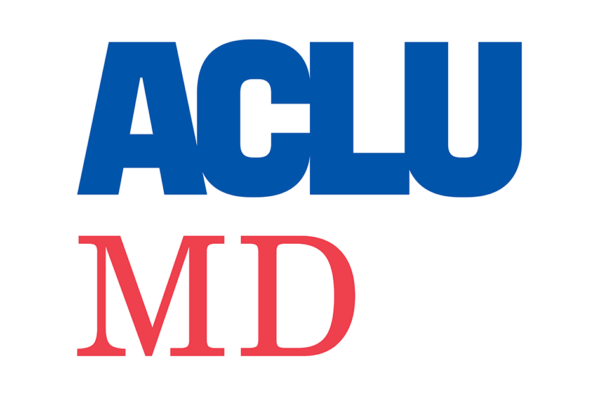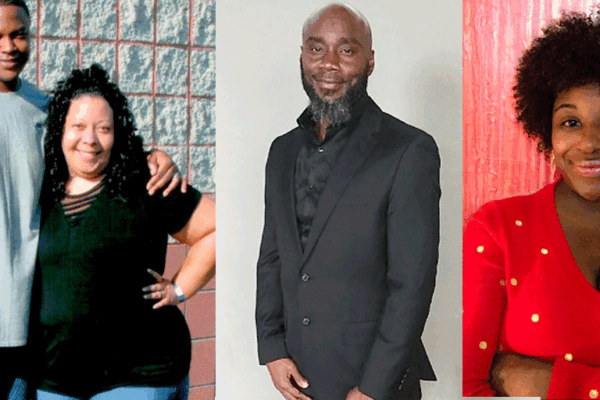Court of Appeals Called on to Sound Alarm about Unfolding Crisis by Taking Quick Action to Ensure Compliance with CDC Guidance
BALTIMORE – Following weeks of public calls from some of the world’s most renowned public health experts, people in law enforcement, corrections staff, and courts across the country sounding the alarm about the need to take drastic steps to reduce population density in places of detention, an emergency court petition was filed overnight that joins families whose loved ones are incarcerated, public health experts, former state officials, attorneys, and civil rights organizations in asking the Maryland Court of Appeals intercede to guide officials around the state in preventing the spread of COVID-19 in places of detention and beyond.
The Petitioners – representing scores of others with similar concerns – include:
- The Maryland Criminal Defense Attorneys Association (MCDAA), an organization of attorneys representing Marylanders detained in prisons and jails;
- The Lifer Family Support Network, an organization made up of people who gather regularly to share information and advocate for the safety and humanity of their loved ones serving sentences inside Maryland’s prisons and jails.
- Lorie Friend, a nurse and mother, whose son is part-way through a four-month sentence at the local detention center in Garrett County on a nonviolent misdemeanor charge; and
- Julie Magers, whose severely disabled husband risks of severe complications from COVID-19 infection if not released from incarceration.
- They are supported in the filing by numerous prominent public health experts, including Dr. Chris Beyrer, and former Maryland state officials, including former Maryland Health Commissioners Georges Benjamin and Joshua Sharfstein, and former Public Safety Secretary Stuart O. Simms.
Petitioners urge the Court to look to the remedies adopted by other courts and jurisdictions across the country, as well as those proposed by Maryland officials, to contain the spread of COVID-19 in jails and prisons:
- Prioritize for release prisoners at the highest risk as defined by the guidance from the Centers for Disease Control, including prisoners above the age of 60, those with chronic illnesses or disabilities;
- Require Courts to expedite individualized determinations of suitability for release consistent with public health and public safety;
- Cease new admissions to the system unless necessary to address a threat to public safety;
- Expand the discretion of the Courts to make release decisions by eliminating certain procedural obstacles, include the waiver of certain time limits, and through the use of telephonic or video hearings;
- Require the State to exercise its existing authority to release prisoners through the parole proceedings, good time credits, medical parole, home detention and clemency;
- Mandate that the State take all measures for screening, cleaning, hygiene and social distancing that the CDC recommends for correctional facilities;
- Undertake measures that will reduce the number of detained juveniles; and
- Encourage the Governor to work with the Parole Commission to exercise his commutation authority to release as soon as possible incarcerated persons who pose little risk to public safety.
Declarations filed with the Court supporting the Petition include the following:
Chris Beyrer, MD, MPH, Professor of Epidemiology at Johns Hopkins Bloomberg School of Public Health in his declaration supporting the Petition said:
“The evidence concerning COVID-19 indicates that once it enters a detention center, it spreads significantly faster inside the detention center than outside.”
“Releasing as many inmates as possible is important to protect the health of inmates, the health of correctional facility staff, the health of health care workers at jails and other detention facilities, and the health of the community as a whole.”
In addition, Dr. Beyrer cautions that Governor Hogan and state and local correctional officials “have not indicated that Maryland correctional facilities have implemented or plan to implement the measures necessary to achieve social distancing, screening, medical isolation or quarantine, or enhanced hygienic practices that has been deemed essential to prevent the spread of coronavirus.”
In addition to explaining the extraordinary threat COVID-19 poses to people who are detained, staff, and the public health if the virus spreads in correctional settings, the petition describes how the State’s lack of a clear plan and guidance for places of detention, including reducing populations, has delayed the needed response: population reduction. It includes reports of serious concerns at detention facilities across the state showing failure to practice social distancing, lack of understanding of what public health experts are urging, and dangerous failures in isolation and quarantine.
Martina Hazelton, founder of the Lifer Family Support Network, in her declaration, said:
“I am terrified for the safety of my husband and many others who are confined in prison and jails, which are ill-prepared for the inevitable introduction of the virus to their facilities. Based on years of visiting prisons in Maryland communicating on a regular basis with my husband, I do not think Maryland’s prisons are capable of implementing the required social distancing and hygiene needed, nor providing minimally adequate medical care, without major changes.”
“I am especially worried about what will happen as the virus spreads and staffing is further reduced as correctional officers and other administrative and contract staff start being turned away due to illness or quarantine.”
Georges C. Benjamin, M.D, Executive Director of the American Public Health Association, and former Maryland Health Secretary, in his declaration said:
“An outbreak in prison could have a devastating impact on public health far beyond the prison walls. Staff who enter and leave the facility could transmit the virus to the broader community and demands for intensive care beds and ventilators could overwhelm local hospitals and health care providers. It is essential at this time that all steps are taken to reduce infection and to ‘flatten the curve’ to ensure that our health care system does not collapse.” Dr. Benjamin also makes clear: “Many people in custody have chronic illnesses and some are serving long sentences and have grown older while incarcerated. While everyone is vulnerable to serious illness or death if they contract COVID-19, people with medical conditions or who are older are at greater risk.”
Arguing that the measures taken by the federal government and other jurisdictions across the country show there is no reason the State of Maryland cannot balance public health and public safety, the Petitioners urge the Court of Appeals to direct trial courts and State law enforcement to work together to reduce the number of people in detained to reduce the rate of transmission and risks of serious harms, as public health officials have urged.
Sample of impacted people who are currently incarcerated in Maryland who are mentioned in the lawsuit:
- 40 year-old with high blood pressure, which causes a six-times higher risk of mortality from COVID-19.
- 80 year-old with numerous medical issues who the Maryland Parole Commission has previously determined that could safely be released.
- 73 year-old who has suffered a massive stroke, has high blood pressure, and other related medical conditions.
- 48 year-old who has Stage 2 hypertension, making him much more vulnerable to serious illness.
- 51 year-old who suffers from chronic illnesses and permanent disabilities, including progressive multiple sclerosis and heart disease.
Importantly, if these actions are taken Marylanders who are released from incarceration will be able to engage in social distancing in the community while those that remain will be in less crowded conditions and better able to avoid infection. These reasonable measures will reduce transmission and infection and help to ensure that hospitals and health care providers are not unnecessarily overwhelmed by preventable infections from prisons and jails.
Sonia Kumar, Senior Staff Attorney at the ACLU of Maryland, said:
“We are living through COVID-19 in the era of mass incarceration and these are unprecedented times. We have no more time to lose. We are asking our State’s highest court to do what courts across the country have done: Sound the alarm, get the needed agencies to work together, and save lives.”
Jonathan Smith, Executive Director of the Washington Lawyer’s Committee for Civil Rights and Urban Affairs, said:
“COVID-19 poses an unprecedented threat to the health of people who are imprisoned and staff and creates a risk of overwhelming our health care system. Now is the time for urgent action to send home prisoners who can safely be released and reduce the density in prisons and jails so that those who remain can engage in social distancing and employ other measures to stop the spread. Waiting for the further spread will be too late.”
The petitioners are represented by John A. Freedman and Samuel Shapiro from Arnold & Porter; Jonathan Smith and Emily Gunston from the Washington Lawyer’s Committee for Civil Rights and Urban Affairs; Debra Gardner from the Public Justice Center; Deborah Jeon, Sonia Kumar, and David Rocah from the ACLU of Maryland Foundation; Brandon Buskey, Somil Trivedi, and Andrea Woods from the American Civil Liberties Union Foundation.
###
Stay Informed
Sign up to be the first to hear about how to take action.
By completing this form, I agree to receive occasional emails per the terms of the ACLU’s privacy statement.
By completing this form, I agree to receive occasional emails per the terms of the ACLU’s privacy statement.




